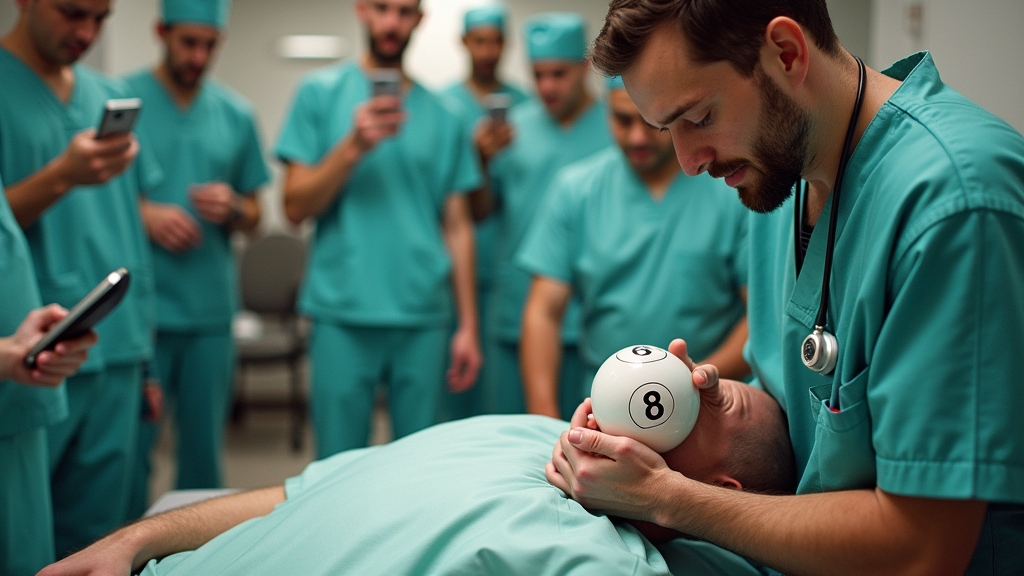LOCAL MAN’S COMPUTER MELTS DOWN AFTER BEING FORCED TO PROCESS MEDICAL DATA THAT’S ‘WHITER THAN A Vermont SKI RESORT’
Silicon Valley, CA — In what experts are calling the most predictable technological catastrophe since Clippy became self-aware, medical AI programs across the nation continue to be developed using datasets so white they could get sunburned from a desk lamp.
PULSE OXIMETERS: ACCURATE FOR WHITE GUYS, COIN FLIP FOR EVERYONE ELSE
A bombshell investigation has revealed that pulse oximeters, those little finger clamps that measure blood oxygen levels, are about as reliable for people of color as a weather forecast from a Magic 8-Ball. According to MIT researcher Leo Anthony Celi, these devices were primarily tested on “healthy young males,” meaning they work perfectly if you’re a 25-year-old CrossFit bro named Chad but might be dangerously inaccurate for literally anyone else.
“We’ve been optimizing medical equipment on healthy young dudes since forever,” explained Dr. Bianca Realization, Director of the Center for Obvious F@#king Problems in Medicine. “The FDA basically requires that a device works well on people who probably don’t need medical attention in the first place. It’s like testing flotation devices exclusively on professional swimmers.”
ELECTRONIC HEALTH RECORDS: DIGITAL GARBAGE FIRES POWERING TOMORROW’S AI
Despite being described by experts as “absolute trash heaps of inconsistent information,” electronic health records continue to be the primary data source for medical AI development. These systems, originally designed to maximize billing rather than patient care, are apparently the perfect foundation for algorithms that might one day decide whether you live or die.
“The electronic health record system is to be replaced,” Celi optimistically states in the report, “but that’s not going to happen anytime soon,” he adds, presumably while staring hopelessly into the middle distance.
COURSES TEACHING AI DEVELOPMENT FORGET ONE TINY DETAIL: THE DATA SUCKS
In a shocking twist that surprised absolutely no one, researchers discovered that most courses teaching AI development completely skip over the part where students learn to question if their data is catastrophically biased.
“We reviewed 11 courses and found that only five even mentioned bias,” said research assistant Dr. Hugh Gaping-Oversight. “It’s like teaching someone to build a rocket ship but forgetting to mention gravity exists.”
According to inside sources, most course content focuses on exciting topics like “How to Build Cool Models” and “Look at These Fancy Visualizations” while completely ignoring lessons like “Your Data Is Probably Sh!t” and “How Not to Accidentally Create a Racist Algorithm.”
DATATHONS: WHERE PEOPLE FINALLY REALIZE HOW TERRIBLE EVERYTHING IS
The MIT Critical Data consortium has been organizing “datathons” since 2014, events where healthcare workers and data scientists gather to examine medical databases and collectively have existential crises about the state of healthcare data.
“Our main objective is to teach critical thinking skills,” explains Celi, who apparently believes that putting doctors and data scientists in the same room will magically produce wisdom. “You cannot teach critical thinking in a room full of CEOs or a room full of doctors.”
According to surveys, 97.8% of datathon participants leave these events saying, “Holy sh!t, I had no idea how bad the data was,” while the remaining 2.2% were too busy having nervous breakdowns to complete the questionnaire.
LOCAL DATABASES RELUCTANT TO BE ANALYZED BECAUSE THEY KNOW THEY’RE GARBAGE
When approached about sharing their data for analysis, 89% of local healthcare databases reportedly developed sudden technical difficulties or claimed they needed to “wash their hair that day.”
“There’s resistance because they know that they will discover how bad their data sets are,” Celi admits. “MIMIC took a decade before we had a decent schema, and we only have a decent schema because people were telling us how bad MIMIC was,” he added, while nervously chuckling in a way that suggests everything is fine when it absolutely is not.
CONCLUSION: WE’RE ALL DOOMED, BUT LIKE, IN A PRODUCTIVE WAY
As AI continues to infiltrate healthcare faster than bacteria in an unwashed hospital bathroom, researchers remain cautiously optimistic that someday, maybe, possibly, if we’re really lucky, we might develop algorithms that don’t just work great for Chad but also for his 80-year-old grandmother with heart failure.
Until then, experts recommend asking your doctor whether the AI helping diagnose you was trained on people who look even remotely like you, or if it’s just guessing based on data from the demographic equivalent of the audience at a Dave Matthews Band concert.





